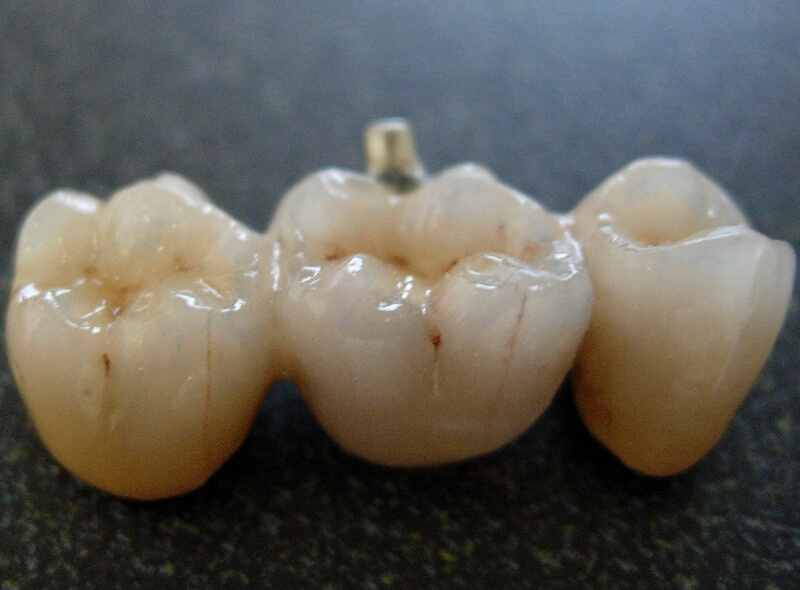Dental Bridges
What are dental bridges?
Dental bridges are appliances commonly used to replace one or more missing teeth. Bridges are cemented to the natural teeth or implants (called abutments) surrounding the empty space. The abutments serve as anchors for the bridge. A replacement tooth, called pontic, is attached to the crowns that cover the abutments.

Why do we need a dental bridge?
Gaps left by missing teeth cause the remaining teeth to rotate or shift into the empty spaces, resulting in a bad bite. The imbalance caused by missing teeth can also lead to gum disease and temporomandibular joint (TMJ) disorders. Dental bridge literally bridges this gap thereby taking care of the problems that might occur because of the missing teeth.
When do we need a dental bridge?
We need a dental bridge under following circumstances:
- Restore the patients smile.
- To restore the ability to properly chew and speak.
- Maintain the shape of the patients face.
- Distribute the forces in the patients bite properly by replacing missing teeth.
- Prevent remaining teeth from drifting out of position.
What types of dental bridges are available?
There are three main types of dental bridges that are available:
Traditional bridges – involve creating a crown for the tooth or implant on either side of the missing tooth, with a pontic in between. Traditional bridges are the most common type of bridge and are made of either porcelain fused to metal or ceramics.
Cantilever bridges – are used when there are adjacent teeth on only one side of the missing tooth or teeth. This is not very common any more and is not recommended in the back of the mouth where it can put too much force on other teeth and damage them.
Maryland bonded bridges – (also called a resin-bonded bridge or a Maryland bridge) are made of porcelain, porcelain fused to metal, or plastic teeth and gums supported by a metal or porcelain framework. Metal or porcelain wings on each side of the bridge are bonded to the existing teeth.
How long does a dental bridge last?
Dental bridge can last anywhere between 5 to 15 years or even longer. With good oral hygiene, it is not unusual for the life span of a fixed bridge to be over 10 years.
How Do I Care for a Bridge?
It is important to keep remaining teeth healthy and strong, as the success of the bridge depends on the solid foundation offered by the surrounding teeth. Brushing twice a day and flossing and using an antiseptic mouthwash daily help prevent tooth decay and gum disease that can lead to tooth loss. To prevent damage to the new bridge, avoid chewing hard foods, ice or other hard objects.
What problems could develop due to dental bridges?
Difficulty in Eating – Till the time one is accustomed to a bridge the patient might face difficulty in eating. During this period the patient should eat soft food that has been cut into small pieces.
Difficulty in Speaking – There can be problem in speech as the patient might initially find it difficut to speak clearly. Wearing a dental bridge with the anterior teeth in their proper relationship will help the patient speak properly.
FAQs on dental bridges
If you want to make your dental bridges in Siliguri, you need to consult a dentist.
Dr Shikha Agarwal, among the top dentist in Siliguri, will make your dental bridges.
Timings of Dr Shikha Agarwal is as below:
Morning: 10:00 am to 1:00 pm ( Monday to Saturday)
Evening: 5:00 pm to 8:00 pm ( Monday to Saturday)
Yes, it is recommended that you book an appointment before you consult Dr Shikha Agarwal.
To book an appointment with Dr Shikha Agarwal please call the reception desk at 9832229559 or 9547612556. For more details visit this link – book an appointment with Dr Shikha Agarwal



